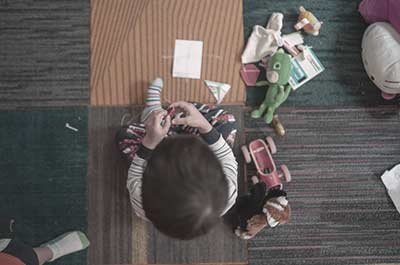One of the challenges of being a parent is keeping your kids from getting overstimulated. It can be tough to know how much stimulation is too much, especially when your kids are young and constantly exploring their environment. Here are 10 ways to help keep your kids from getting overstimulated:
Keep a daily routine.

You know that feeling when you’ve been running around all day, and you’re just about ready to lose it? Your kids probably feel that way sometimes, too. Overstimulation is a real problem for kids, and it can lead to meltdowns, tantrums, and general crankiness. Fortunately, there are a few things you can do to help keep your kids from getting overstimulated in the first place.
One of the best things you can do is to keep a daily routine. Having a set time for meals, naps, and playtime will help your kids know what to expect and give them a sense of security. It would help if you also tried to limit the number of new experiences they have each day. Too much change can be overwhelming for little ones. Finally, make sure they have plenty of time to relax and unwind.
Routines are important for young children because they provide a sense of predictability and stability in an otherwise chaotic world. By establishing a daily routine, you can help your child feel more secure and less overwhelmed by the constant stimuli around them.
Create a calming environment.
An overstimulated environment can be overwhelming for kids, so creating a calm and peaceful space at home is important. One way is to limit the amount of noise in the house. This can mean turning off the TV, putting away phones and tablets, and avoiding loud games.
You can also help reduce overstimulation by using soft lighting, soothing colors, and gentle music to create a calming atmosphere. You might also want to limit the number of toys and other objects in your child’s environment. Too much clutter can be overwhelming for little ones.
Finally, make sure there are plenty of comfortable places for your child to rest. Soft blankets and stuffed animals can help them feel safe and secure, while a weighted blanket can provide a sense of grounding and peace. By creating a calm environment, you can help your child manage their energy levels and avoid feeling overwhelmed.
Watch for signs of overstimulation.
Spending time with kids is one of the joys of being a parent. However, it’s essential to be aware of the signs that your children may be overstimulated; here are some signs to look for:
- If they’re unusually cranky or crying more than usual, they may be feeling overwhelmed.
- If they’re not sleeping well or having trouble concentrating, that may be a sign that they’re overstimulated.
- If they’re withdrawing from social interaction or acting out more than usual, that may also be a sign of overstimulation.
As a parent, it’s important to attune yourself to your child’s mood and energy level and provide them with the appropriate amount of space and time to recharge. By being attuned to their needs, you can help ensure that your children always have a happy and healthy childhood.
Encourage outdoor play.
There’s nothing like fresh air and sunshine to help rejuvenate the mind and body. And there’s no better place to find it than outside! Encourage your kids to get plenty of outdoor playtime. Let them run, jump, and explore to their heart’s content.
Outdoor play is great for physical activity, and it can also help reduce stress and anxiety. The natural world is full of sights, sounds, and smells that can help calm and relax the mind. So get outside and enjoy the fresh air! If possible, try to encourage outdoor play every day. Even a short walk around the block can make a world of difference.
In addition to encouraging outdoor play, you can also help your child release some energy by playing active games indoors. Things like tag, hide-and-seek, and Simon Says are all great options. Just make sure not to overdo it – too much activity can lead to more overstimulation problems.
It’s important to let kids be kids and get their energy out. But sometimes, all that running around can lead to them feeling overwhelmed.
Try to keep them on a regular sleep schedule.

One of the best ways to avoid overstimulation is to ensure your kids are getting enough sleep. A regular bedtime routine can help promote healthy sleep habits, and it’s important to stick to it as much as possible. This means no late nights or early mornings, especially on weekends.
It’s also important to create a calm and relaxing environment at bedtime. This means no screens for at least an hour before bed, as the blue light can interfere with sleep. You might also want to try reading a bedtime story or using a white noise machine to help your child fall asleep.
Getting enough sleep is crucial for kids, as it helps them regulate their emotions and avoid getting overwhelmed.
Establish rules and limits on screen time.
In today’s world, it’s nearly impossible to avoid screens altogether. But it’s important to establish rules and limits on screen time. This will help your child avoid becoming overstimulated by the constant stimulation of screens.
One way to limit screen time is to set a rule that screens can only be used during certain times of the day. For example, screens can be used for an hour after school and then again for an hour before bed. This will help your child to have some time away from screens to relax and unwind.
Another way to limit screen time is to establish rules about what content can be accessed. For example, you might only allow your child to watch age-appropriate shows and use educational apps. By setting these limits, you can help your child avoid becoming overwhelmed by too much screen time.
Screens are everywhere, and it’s important to establish rules about using them. This will help your child avoid becoming overstimulated by the constant stimulation of screens.
Encourage breaks throughout the day.
It’s important to encourage breaks throughout the day, as this will help your child avoid becoming overwhelmed. Taking a few minutes to relax and rejuvenate can make a world of difference.
First, you can set a timer for a certain amount of time and have your child take a break when the timer goes off. This will help them learn how to pace themselves and avoid getting too overwhelmed. This can mean anything from letting them take a few minutes to themselves in their room to going outside for some fresh air. You can also create opportunities for calming activities, such as reading or playing calm music.
Help them develop a sense of self-control and discipline.
There’s no doubt that kids need to develop a sense of self-control and discipline in order to succeed in life. But as any parent knows, getting them to focus on their goals can be a challenge. One way to help your kids develop these important skills is to give them opportunities to practice self-control and discipline daily. There are a few things you can do to help your child develop self-control and discipline:
- Encourage them to set goals and work towards them. This will help them learn to delay gratification and stay focused on what’s important.
- Teach them how to manage their emotions. This includes both positive and negative emotions and will help them avoid outbursts or tantrums.
- Give them opportunities to practice making decisions. This will help them learn how to weigh different options and make choices that align with their goals.
Finally, be patient and understanding; executive function skills take time to develop, and your kids will likely make some mistakes along the way. By taking a positive and supportive approach, you can help your kids develop the self-control they need to be successful in life.
Encourage independent playtime.

Most parents know the importance of giving their kids some independent playtime. It’s a great way for them to explore their creativity, use their imagination, and just have some fun. But sometimes, it can be hard to encourage your kids to play independently.
One of the best ways to encourage independent play is to provide plenty of opportunities for it. Make sure there are plenty of toys and materials available for them to use. And try to create an inviting space for them to play in where they feel comfortable and relaxed. It can also help to be a role model. Let your kids see you playing on your own or working on a project. This will show them that it’s something that adults do, too, and that it can be enjoyable.
Finally, don’t be afraid to let your kids make mistakes. They’re going to try new things, and they’re bound to make mistakes along the way. But that’s all part of the learning process. So just relax and let them have fun.
Provide plenty of opportunities for sensory exploration (playing with sand, water, etc.)
Sensory exploration is important for kids of all ages. It helps them to understand and process the world around them. There are endless possibilities: Kids can get their hands dirty with sand, water, paint, or just plain old dirt. They can also explore different textures and temperatures, as well as sounds and smells. It’s a great way for them to burn off excess energy and explore their senses in a safe and controlled environment.
The important thing is to provide plenty of opportunities for exploration. It’s also important to let kids get messy! Sensory play is a great way to encourage creativity and problem-solving, as well as fine and gross motor skills. And it’s just plain fun! Best of all, it’s easy to set up and can be done indoors or outdoors. So don’t be afraid to let your kids get a little (or a lot) messy when they’re exploring their senses.
Conclusion.
By following these tips, you can help your kids stay calm and focused and avoid becoming overstimulated. With a little patience and understanding, you can help them develop the skills they need to be successful in life. Thanks for reading! I hope you found this article helpful.
What are your thoughts? Do you have any tips to add? Please share in the comments below!

Dive into the insights of Matthew Mansour, a seasoned life coach, fitness guru, and health mentor. With a portfolio boasting over 800 thought-provoking articles, Matthew is passionate about unraveling the intricate layers of the human psyche. His reading choices? Books that shed light on our unique human journey, helping him (and his readers) harness the power of the mind, transforming challenges into stepping stones.
Matthew proudly wears his badge as a self-help aficionado. His mantra? There’s always room to grow, learn, and be inspired. He thrives on gleaning wisdom from pioneers, turning their experiences into valuable lessons for all.
Always on the pulse of emerging trends, Matthew immerses himself in groundbreaking courses and research centered around life coaching and holistic health. Eager to impart his knowledge, he’s here to guide anyone keen on enhancing their life journey.
Beyond his professional persona, Matthew is a devoted animal lover, a proud New Jersey resident, and a doting husband and father. Dive into his self-improvement blog and let Matthew guide you towards a life filled with purpose and passion!
Reviewed By: Joanna Perez and Marcella Raskin
Edited By: Lenny Terra
Fact Checked By: Gabrielle J. Smith
Photos Taken or Curated By: Matthew Mansour